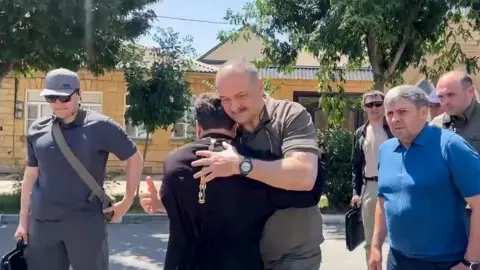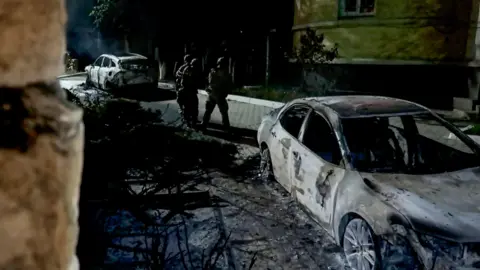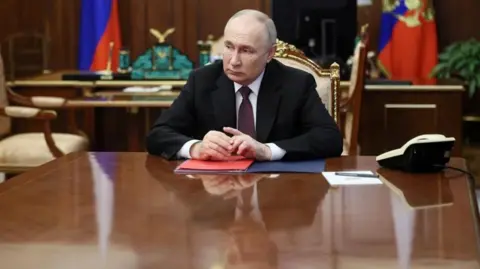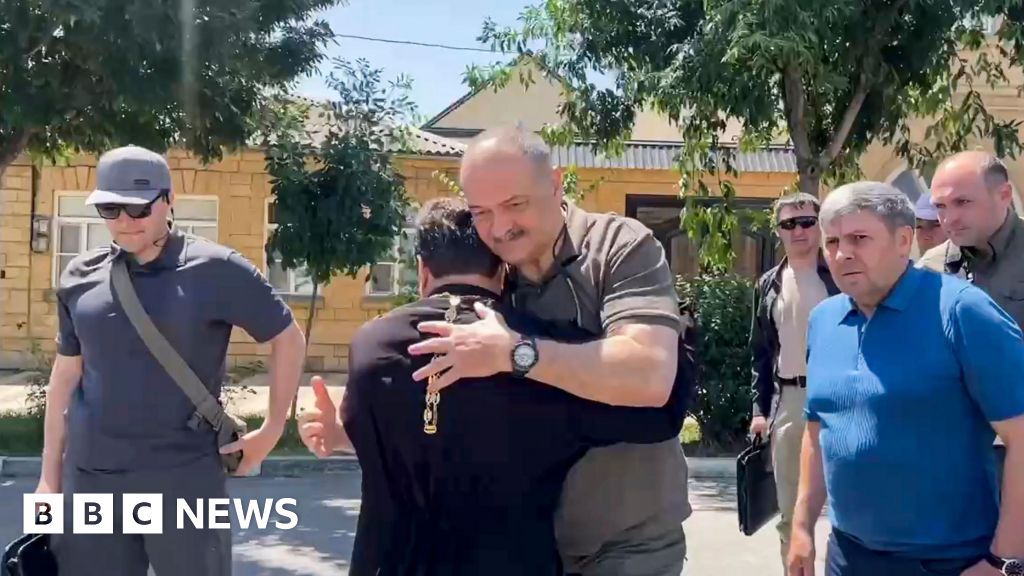By Steve Rosenberg, Russia editor
 EPA
EPATrinity Sunday is one of the most important holidays in the Orthodox calendar.
On this special day, 66-year-old Father Nikolai was in church in the city of Derbent, Dagestan.
Located in Russia’s North Caucasus region, Dagestan is a predominantly Muslim republic. But Derbent is known as “the city of three religions”.
It’s one of the oldest Christian centres in Russia and home to an ancient Jewish community.
Both were about to be attacked in the most brutal fashion.
On Sunday evening gunmen stormed the church and murdered Father Nikolai. They also attacked the local synagogue, setting it on fire.
‘We’re all too frightened’
Around the same time insurgents were also on the rampage in Makhachkala, the capital of Dagestan, targeting a church and synagogue there, too.
Faced with this dramatic coordinated attack, security forces launched an “anti-terrorist operation”. In Dagestan, gun battles raged long into the night. At least five of the attackers were killed.
But why had they gone on a shooting spree?
The immediate suspicion: links to Islamist extremism. After all, not long ago, Dagestan was a hotbed of extremism that had spilled over from neighbouring Chechnya.
When I visited Makhachkala back in 2010, nearly every day there were reports of militants attacking police and local officials.
During that trip, a policeman called Magomed had told me:
“Whenever I get out of the police car, I always wonder if the insurgents will see my uniform and shoot me. Six of my colleagues have been killed this year. At night you won’t find any policemen on the streets. We’re all too frightened.”
 EPA-EFE/REX/Shutterstock
EPA-EFE/REX/ShutterstockThe chronic economic and social problems of the region – high unemployment and rampant corruption – were feeding extremism.
Radical ideas thrive in such a soil.
In recent years Russian security forces have appeared to be winning their battle against armed insurgents.
But Islamist attacks haven’t stopped. On several occasions the Islamic State group (IS) has claimed responsibility for attacks in Dagestan, including a shooting outside a church in the city of Kizlyar in 2018.
And yet, when Russian MP Abdulkhakim Gadzhiev went on Russian state TV to comment on Sunday’s bloodshed, he had a very different explanation for what had happened.
Mr Gadzhiev suggested that the intelligence services of Ukraine and Nato countries may have orchestrated the attacks. He provided no evidence to back up his accusation.
And when the pro-Kremlin news site Komsomolskaya Pravda reported on events in Dagestan, it accused the “collective West” of trying “to open a second front” against Russia.
The writer continued: “When it comes to unrest in this region traditionally it’s the ears of British intelligence that stick out.”
Blaming Ukraine – and the West. It reminds me of official Russian reaction to a mass shooting back in March. More than 140 people had been killed after gunmen stormed the Crocus City Concert Hall near Moscow.
The Russian authorities pointed the finger of blame at Kyiv and Western countries, even though IS had already claimed responsibility for the attack and released video of it.
Days later President Vladimir Putin had even insisted: “Russia cannot be the target of terrorist attacks by Islamic fundamentalists. We are a country that demonstrates a unique example of interfaith harmony and inter-religious and inter-ethnic unity.”
 Reuters
ReutersWhy do the Russian authorities appear reluctant to acknowledge and discuss the Islamist threat?
It has, I believe, to do with the war in Ukraine.
Ever since Russia’s full-scale invasion of its neighbour, the Russian public has been led to believe that the greatest danger they face, the biggest threat to their country, emanates from Ukraine and the West.
The authorities want Russians to view Kyiv and the “collective West” as public enemy number one.
If people don’t, they may begin to wonder why has Russia been pouring resources into a war with Ukraine instead of focusing on countering Islamic extremism?
But not everyone here believes that Ukraine has been plotting Islamist attacks on Russia.
In response to Abdulkhakim Gadzhiev’s TV comments, a prominent Russian Senator Dmitry Rogozin wrote on social media:
“If we blame every terrorist attack linked to national and religious intolerance…on scheming by Ukraine and Nato, this pink mist will lead us to bigger problems.”
Mr Rogozin is well known for his anti-Western rhetoric. But even he appears to understand that Russia has little to gain from automatically pointing the finger of blame at Kyiv and Western nations.


